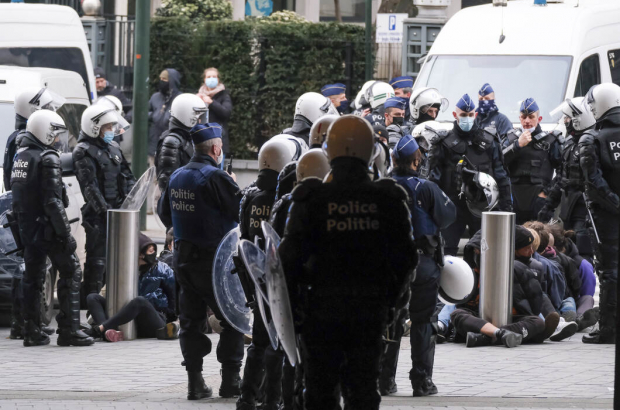- Daily & Weekly newsletters
- Buy & download The Bulletin
- Comment on our articles
Parents of arrested minors complain of slow progress in police violence investigations
Almost a year ago, 91 minors were among the 245 people arrested outside and around Brussels-Central station after a demonstration against class injustice.
Following the arrests, many of the young people complained of violence and abuse by the police. Their parents are now organising a new demonstration on Saturday, again outside the station.
They will gather in protest at the lack of progress in the investigations by the public prosecutor's office and the police watchdog, Committee P, into the alleged police brutality.
Alexandre Pycke, the father of Simon who was arrested during the demonstration, is one of the co-founders of the Parents' Collective Against the Police violence on 24 January.
He is also one of the parents that filed a complaint with the justice department against the conduct of the police. In his complaint, he collected many testimonies from young people who were transferred to the Etterbeek Barracks police station that he later made public.
"I got a blow on the left side of my forehead,” one detainee wrote. “I felt that there was metal in the glove that the officer was wearing."
"I was completely stunned,” the account continued. “Then I looked at him and he slapped me and shouted at me, ‘Lower your eyes.’ The blow was so hard that I hit my head against the wall. Three policemen passed in front of me and all three beat me. All the young people, I would say about 20, were assaulted in that way. You couldn't look up because then you were hit."
At the end of January last year, Pycke wrote a letter to the Brussels mayor Philippe Close, who is ultimately responsible for the Brussels-Capital/Ixelles police zone. "What happened behind closed doors in the barracks of Etterbeek is chilling,” the father wrote. “In the corresponding testimonies of many young people there is shocking violence, which I only knew from reports of police actions in non-democratic countries."
At that time, Pycke asked the mayor to remove the police officers in question from their positions and to install cameras in the cells. He also called for clear procedures and denounced the internal investigation carried out by the Brussels-Capital/Ixelles police zone itself, because he doubted the objectivity of such an investigation.
Finally, he filed a collective complaint with some other parents, but it was rejected. Because the judge did not consider the complaint as a collective complaint, the costs of the case ranged from €250 to €5,000 if the complainants each filed a separate criminal complaint, which resulted in many parents dropping out. Pycke submitted an individual complaint, but that had much less impact, he admitted.
The investigation conducted by the public prosecutor's office is still ongoing. The Brussels public prosecutor's office cannot say when the complaint will be dealt with, nor why the collective complaint was refused. Committee P says that it has decided to deal with all complaints about demonstrations over the past year together, in order to formulate some general recommendations from the experience.
In terms of working conditions, something has changed. The ACOD – the union that previously brought out the letter from the whistleblowers within the police – has fought for the placement of cameras in the barracks. "We know from experience that the presence of cameras generally calms things down on both sides," said Valérie Leclercq, welfare manager of ACOD within the Brussels-Capital/Ixelles zone.
The zone itself has provided a camera in the corridors of the cell complex, in anticipation of the complete renovation of the complex by the federal police and the Buildings Agency, reports a police spokesperson. "We have repeatedly urged at a federal level for this to be done and are also prepared to install our own. In the meantime, the bodycams will also be turned on."
The organisational structure has also been adjusted: whoever arrests people at the scene will not be the officer who guards the same people in the cell. "The work on the ground can be very stressful, police officers often encounter bad behaviour on the ground," said Leclercq. "We are already facing a staff shortage and the work is not for everyone. If the officer who receives the person is different from the one on the premises, that already calms things down. There have been no extreme tensions since that change."
Leclercq admits that it is not always easy to report abuses within the police. "Our loyalty sometimes goes too far," she says. "Whistle-blowers are treated as traitors. The police work with a kind of military regime, but on the other hand there is also a strong team spirit. In the case of this demonstration, there were a dozen police officers who sounded the alarm, and we as a union made it public."
That is not enough for the parents’ collective. For them the justice department and Committee P are working too slowly and not in a transparent way. With the planned demonstration this weekend, they want to bring the subject back to the public’s attention.
To help other citizens who come into contact with the same problems in the future, Pycke and a few others will soon launch an online platform with information about police violence. "We want to show people who want to file a complaint where they can find lawyers specialised in police violence, and work to ensure that whistle-blowers within the police are better protected."
In addition to providing information, the members of this platform will also advocate a truly independent institute to handle complaints, similar to the British Independent Office for Police Conduct.


















